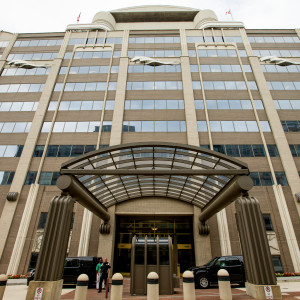Federal Communications Commission Chairman Tom Wheeler outlined his plan Friday for new regulations over the Internet market for businesses, where Democrats at the agency say competition has stagnated and small providers accuse larger of engaging in anticompetitive practices.
“Business data services, historically known as special access, are little known but hugely important in our connected economy and society,” Wheeler wrote in a blog post Friday. “These dedicated network connections are used by offices, retailers, banks, manufacturers, schools, hospitals and universities to move large amounts of data. Consumers use them indirectly every time they withdraw cash from an ATM or swipe their credit card at a retail store.”
The special access market is made up of incumbent local exchange carriers — legacy providers like AT&T and Verizon which inherited large swaths of their copper-based network infrastructure from Bell, and competitive local exchange carriers — small providers like Sprint and Level 3.
To boost competition the FCC mandates ILECs lease business-dedicated lines to provide the services outlined by Wheeler. Though market share has increased in recent years, meeting triggers resulting in deregulation of certain providers including AT&T in 2009, so have complaints by CLECs like Sprint about anticompetitive leasing rates and so-called “lock-up” contracts resulting in overcharges.
“The marketplace is changing,” Wheeler wrote. “Cable companies are entering the market, and Internet Protocol (IP)-based technologies can now deliver services traditionally satisfied by legacy, circuit-based products. Yet, competition remains uneven, with competitive carriers reaching less than 45 percent of locations where there is demand.”
Instead of adopting blanket regulations atop the overall market, the notice of further proposed rulemaking circulated among the other four commissioners Thursday seeks to identify certain markets in the special access field lacking competition.
“I propose to identify those markets that are competitive, and those that are not, and to adopt a tailored regulatory framework to mirror those distinctions,” the chairman wrote.
He added the new rules will be based on a “technology-neutral framework for business data services (BDS),” and apply to all market players regardless of the networks they use to reach businesses, meaning IP and circuit-based networks will fall under the umbrella, potentially subjecting telecom and cable providers to the same regulated price caps and rates.
“All BDS services should be governed by the same overarching legal principles,” Wheeler said.
The plan ends tariffs in all sectors of the special access market and will reform the “lock-up” contract practices CLECs have highlighted, including all-or-nothing stipulations, early termination and usage shortfall penalties.
Wheeler’s proposal marks the end of an investigation begun in October, which found the previously described practices slow the transition from copper-based networks to IP-based. The commission voted last summer to allow ILECs to retire their copper networks, so long as they offered CLECs access to IP networks at reasonable rates.
Friday’s plan comes one day after Verizon and INCOMPAS, a trade group representing CLECs, released a compromise proposal promoting the tech neutral approach to bring cable providers under the same regulatory umbrella.
“Cable operators are new entrants in the business services market, and are investing heavily in building their own facilities to serve business customers,” the National Cable & Telecommunications Association said in a statement pushing back against the compromise. “They are providing precisely the type of facilities-based competition that the Chairman has praised.”
Pro-net neutrality and tech trade groups including Public Knowledge and the Computer & Communications Industry Association applauded the compromise and FCC proposals.
“No American business large or small, in services or manufacturing, should be held hostage to unfairly high rates for critical data transport simply because there is no competitive alternative and only crippled regulation,” CCIA president and CEO Ed Black said in a statement Friday.
“After a decade of delays, the FCC has the data to analyze the special access marketplace and institute reforms that will promote competition, speed deployment of faster networks, and ultimately promote innovation and economic growth,” Black added.
The FCC will vote on the FNPRM during its monthly open meeting on April 28.
A study out this week from telecom industry found the new regs could have a negative economic impact on broadband deployment and jobs, while a separate study from a CLEC trade group said anticompetitive practices in the special access market have cost consumers $150 billion over the last five years.

